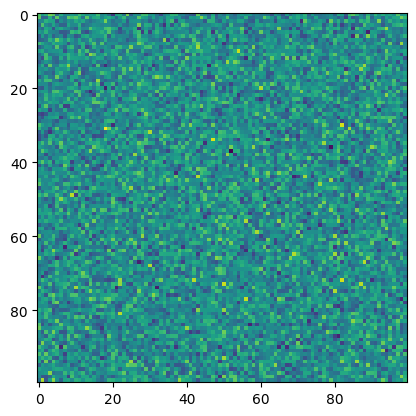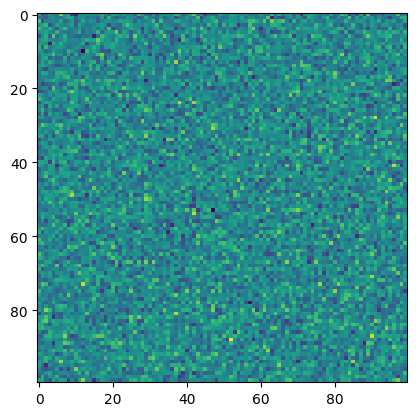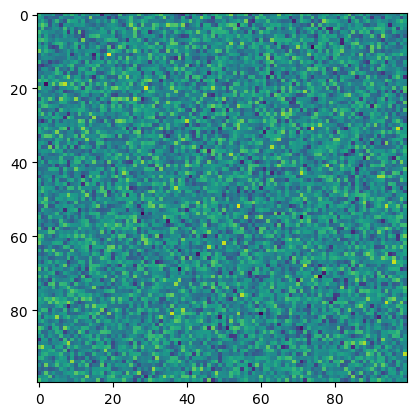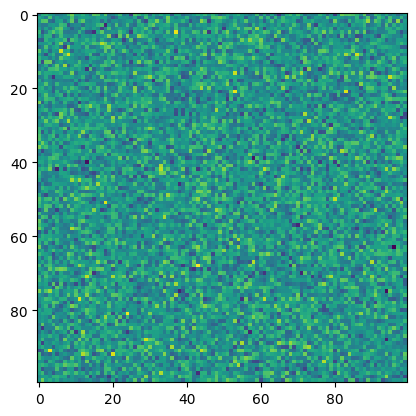Jupyter notebooks#
This is a page to demonstrate the look and feel of Jupyter Notebook elements.
Hiding elements#
Hide cells#
The following cell is hidden.
It also has a thebe-init tag which means it will be executed when you initialize Thebe.
Hide inputs#


Hide outputs#
# Hide output
square = np.random.randn(100, 100)
wide = np.random.randn(100, 1000)
fig, ax = plt.subplots()
ax.imshow(square)
fig, ax = plt.subplots()
ax.imshow(wide)
plt.show()
Hide markdown#
备注
This is a hidden markdown cell
It should be hidden!
And here's a toggleable note
With a body!
Hide both inputs and outputs#
Hide the whole cell#
Enriched outputs#
Math#
# You can also include enriched outputs like Math
from IPython.display import Math
Math(r"\sum_{i=0}^n i^2 = \frac{(n^2+n)(2n+1)}{6}")
\[\displaystyle \sum_{i=0}^n i^2 = \frac{(n^2+n)(2n+1)}{6}\]
Pandas DataFrames#
import pandas as pd
df = pd.DataFrame([['hi', 'there'], ['this', 'is'], ['a', 'DataFrame']], columns=['Word A', 'Word B'])
df
| Word A | Word B | |
|---|---|---|
| 0 | hi | there |
| 1 | this | is |
| 2 | a | DataFrame |
Styled DataFrames (see the Pandas Styling docs).
| A | B | C | D | E | |
|---|---|---|---|---|---|
| 0 | 1.000000 | 1.329212 | nan | -0.316280 | -0.990810 |
| 1 | 2.000000 | -1.070816 | -1.438713 | 0.564417 | 0.295722 |
| 2 | 3.000000 | -1.626404 | 0.219565 | 0.678805 | 1.889273 |
| 3 | 4.000000 | 0.961538 | 0.104011 | nan | 0.850229 |
| 4 | 5.000000 | 1.453425 | 1.057737 | 0.165562 | 0.515018 |
| 5 | 6.000000 | -1.336936 | 0.562861 | 1.392855 | -0.063328 |
| 6 | 7.000000 | 0.121668 | 1.207603 | -0.002040 | 1.627796 |
| 7 | 8.000000 | 0.354493 | 1.037528 | -0.385684 | 0.519818 |
| 8 | 9.000000 | 1.686583 | -1.325963 | 1.428984 | -2.089354 |
| 9 | 10.000000 | -0.129820 | 0.631523 | -0.586538 | 0.290720 |
Interactive outputs#
Folium#
import folium
m = folium.Map(
location=[45.372, -121.6972],
zoom_start=12,
tiles='Stamen Terrain',
attr="Placeholder attr"
)
folium.Marker(
location=[45.3288, -121.6625],
popup='Mt. Hood Meadows',
icon=folium.Icon(icon='cloud'),
attr="Placeholder attr"
).add_to(m)
folium.Marker(
location=[45.3311, -121.7113],
popup='Timberline Lodge',
icon=folium.Icon(color='green'),
attr="Placeholder attr"
).add_to(m)
folium.Marker(
location=[45.3300, -121.6823],
popup='Some Other Location',
icon=folium.Icon(color='red', icon='info-sign'),
attr="Placeholder attr"
).add_to(m)
m
Make this Notebook Trusted to load map: File -> Trust Notebook
Stdout#
# The ! causes this to run as a shell command
!jupyter -h
usage: jupyter [-h] [--version] [--config-dir] [--data-dir] [--runtime-dir]
[--paths] [--json] [--debug]
[subcommand]
Jupyter: Interactive Computing
positional arguments:
subcommand the subcommand to launch
options:
-h, --help show this help message and exit
--version show the versions of core jupyter packages and exit
--config-dir show Jupyter config dir
--data-dir show Jupyter data dir
--runtime-dir show Jupyter runtime dir
--paths show all Jupyter paths. Add --json for machine-readable
format.
--json output paths as machine-readable json
--debug output debug information about paths
Available subcommands: execute kernel kernelspec migrate run troubleshoot
trust
Formatting code cells#
Scrolling cell outputs#
for ii in range(40):
print(f"this is output line {ii}")
this is output line 0
this is output line 1
this is output line 2
this is output line 3
this is output line 4
this is output line 5
this is output line 6
this is output line 7
this is output line 8
this is output line 9
this is output line 10
this is output line 11
this is output line 12
this is output line 13
this is output line 14
this is output line 15
this is output line 16
this is output line 17
this is output line 18
this is output line 19
this is output line 20
this is output line 21
this is output line 22
this is output line 23
this is output line 24
this is output line 25
this is output line 26
this is output line 27
this is output line 28
this is output line 29
this is output line 30
this is output line 31
this is output line 32
this is output line 33
this is output line 34
this is output line 35
this is output line 36
this is output line 37
this is output line 38
this is output line 39
Scrolling cell inputs#
b = "This line has no meaning"
b = "This line has no meaning"
b = "This line has no meaning"
b = "This line has no meaning"
b = "This line has no meaning"
b = "This line has no meaning"
b = "This line has no meaning"
b = "This line has no meaning"
b = "This line has no meaning"
b = "This line has no meaning"
b = "This line has no meaning"
b = "This line has no meaning"
b = "This line has no meaning"
b = "This line has no meaning"
b = "This line has no meaning"
b = "This line has no meaning"
b = "This line has no meaning"
b = "This line has no meaning"
b = "This line has no meaning"
b = "This line has no meaning"
b = "This line has no meaning"
print(b)
This line has no meaning








